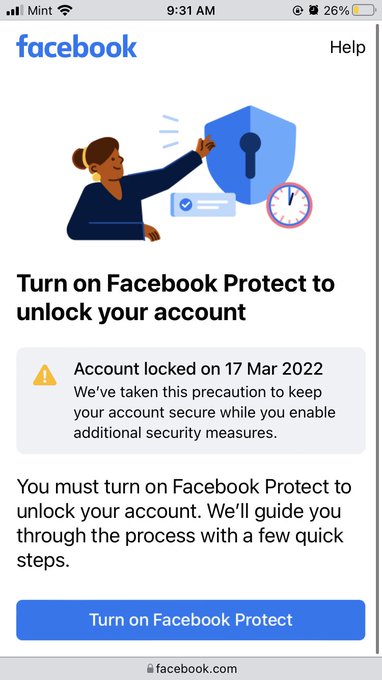Facebook Locks Out Accounts That Haven't Activated Facebook Protect
FacebookMonday, 21 March 2022 at 15:52

At the beginning of March, many Facebook users (in fact, a certain group of users) were getting odd emails from Facebook. The spam-like emails were titled “Your account requires advanced security from Facebook Protect.” Also, the emails were requiring the users to turn on Facebook’s two-factor authentication, the Facebook Protect feature. To ease the process, the emails included corresponding links. Apart from this, Facebook gave a deadline, warning that if not meeting the requirements, they would not access their accounts. Everything looks like classic spam. So many users just ignored it. Alas, it wasn’t spam.
Facebook Protect Is A Must For A Bunch Of Users
As Facebook proves, this is a “security program for groups of people that are more likely to be targeted by malicious hackers, such as human rights defenders, journalists, and government officials.” Simply put, some users are being monitored by hackers. So to protect their accounts, Facebook requires to activate the Facebook Protect feature. It's not new, but it's quite helpful.

"These people are at the center of critical communities for public debate. They enable democratic elections, hold governments and organizations accountable, and defend human rights around the world." But this also means they are at gunpoint.
The emails were sent to users from the address [email protected]. It doesn’t look like a legit mail address of Facebook. So many either removed it or ignored it.
In effect, all those users that didn't start using the Facebook Protect program lost access to their Facebook accounts. The first deadline was Thursday, March 17th. The next day, the net was buzzing about this incident. Many Facebook users were not able to log in to their accounts.
Not Everything As Simple As You Might Think
All those Facebook users who ignored the email and did not activate Facebook Protect before their deadlines got the same message. The latter explains why they can’t sign into their accounts and has some recommendations on how to figure it out. However, as usually happens, it’s not always working:
There are many users who have no access to their accounts even they have activated Facebook Protect. For many users, the text-based 2FA is not working at all:
The third group of users activated it before the deadlines, but the system kicked them off as well.
Tweet not found
The embedded tweet could not be found…
A day later, on March 18th, Meta tweeted: “We’re looking into isolated examples where people may need help enrolling in the program.”
Loading








